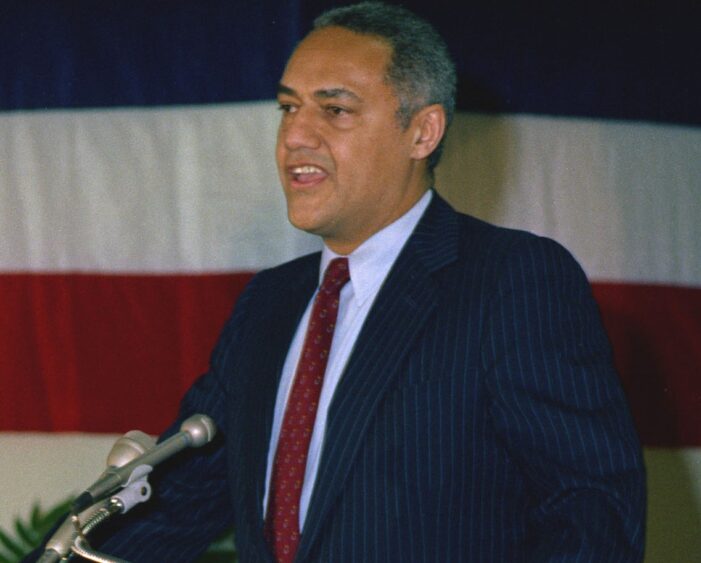By National Urban League
“Cliff was an American original—a civil rights trailblazer whose eyes were never shut to injustice but whose heart was always open. He was like a father to me and an inspiration to Barack. We admired the way he fought and learned from the way he led.” – Michelle Obama
The name of Clifford Alexander, Jr., who died this week at the age of 88, is not as well-known today as some of his contemporaries in the Civil Rights Movement. Perhaps no American, however, has done more to combat segregation and discrimination in private employment and the military or leaves as great a legacy.
I first met him in 1983 during a pickup game on the basketball court at Xavier University in New Orleans. He was then exactly twice my age, with a masterful hook shot, and nearly bested me. I remember being impressed with his stature, both physical – he stood 6’3’ tall – and professional. By then, he had been an advisor to four U.S. presidents, hosted his own television talk show, and was then head of his own consulting firm, Alexander & Associates, which advised organizations including Major League Baseball on recruiting candidates of color.
As one of the architects of the Voting Rights Act of 1965, as an early chair of the Equal Employment Opportunity Commission, and as the first Black Secretary of the Army, Alexander transformed not only government policy but social attitudes regarding racial equity.
A graduate of Harvard University and Yale School of Law and veteran of the Army National Guard, Alexander served as Assistant District Attorney in Manhattan and led community-based organizations focused on improving housing conditions and expanding educational and employment opportunities for youth. In 1963, President John F. Kennedy recruited Alexander, then 29, to serve on the National Security Council.
Alexander served President Lyndon B. Johnson in various positions, becoming one of his closest advisors and helping to shepherd the Voting Rights Act of 1965 into law. But there was one moment where he thought he’d personally doomed the landmark legislation after the Washington Star prematurely published his interview about the upcoming vote.
In an interview with the National Visionary Leadership Project, Clifford described his dressing down by the President:
“President Johnson points to the headline and says, ‘Because of this, we’re not going to have a Voting Rights Act. The Congress does not like to see ahead of time what going to be done.’ I’m about 6’3 or 4”, and by the time I was finished with this lecture I was about three inches. I was trying to mumble my way through this thing and he was saying ‘This was a great, great thing that you were important in doing, significant to your people, and it’s just not going to take place because of what you did.’ I humbly walked out of the room.”
That evening, as Johnson was briefing members of Congress on the legislation, he pointed to Alexander and said, “There’s Cliff Alexander; he’s one of the great young men of my administration.”
“He treated me like he did the white people,” Clifford said. “He kicked my ass when he thought he should, and he praised me to the skies when he thought he should, and he showed himself in front of me.”
Alexander assumed the chair of the EEOC in 1967, immediately launching investigations of individual companies and labor unions as well as entire industries and airing the findings during public hearings. During hearings in 1968 and 1969, he secured promises from the major TV networks “to increase employment opportunities for Negroes and other minority groups as well as to give them fair and honest representation on the TV screen.” But three decades later, in an essay published in the New York Times, he decried those promises as empty.
Those hearings irked then-Senate Minority Leader Everett M. Dirksen, who demanded that Alexander stop harassing “the work-givers of this nation.” Alexander resigned, Mr. Alexander resigned, citing a “crippling lack of support” from the Nixon Administration.
As the first Black Secretary of the Army – the first Black senior civilian official of any branch of the U.S. armed services – he assumed office in 1977 at a turbulent moment. The nation had ended the draft just four years earlier, and the all-volunteer armed forces still were considered an experiment. Critics charged that the draft, which ostensibly cut across class and race lines, resulted in a more equitable force and that ending it had resulted in lower recruit quality. These criticisms were tinged with racism, as Black soldiers made up more than 22% of the Army, twice the percentage Black Americans.
“We, just as Whites, are patriotic and so we volunteer,” Alexander told Ebony magazine. “That has been a part of our history. During the Second World War, our people begged to be put into combat units. Of course, there is also the factor of job discrimination in the private sector and the lack of adequate training for the job market. These reasons lead to large numbers of minorities entering the military. Of course, the bottom line concerns the quality of this force, and the consensus is that it’s a better army than has been out there before.”
He dismissed the notion that the draft was a fairer method of recruiting: “People who were this or that could get special exemptions. The draft always hit harder on poor people; therefore, it was not equitable.”
During his tenure, Alexander promoted thirty Black officers to general, including future U.S. Secretary of State Colin Powell and Hazel Johnson-Brown, the first Black woman general.
With Alexander’s death, the nation has lost one of the unsung heroes of the civil rights movement. His dignity and resolve in the face of hatred and bigotry were inspirational. The deepest condolences of the National Urban League are with his wife, Adele; his children; Elizabeth and Mark; his seven grandchildren, and all who knew and loved him.

